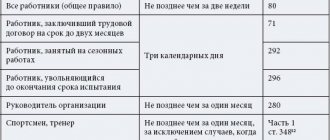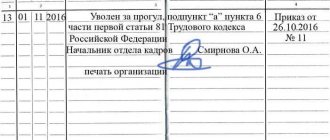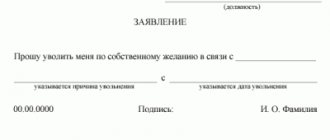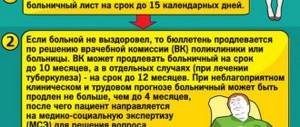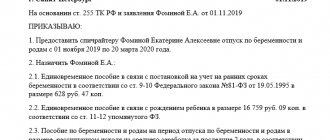What cases might there be
If an employee is forced to often take sick leave for various reasons, he experiences worries about whether he can be fired if he often goes on sick leave. The most common concerns are related to the following circumstances:
- illness of the employee during the term of the employment contract;
- can you be fired for frequent sick leave with a child;
- illnesses during the probationary period;
- long-term illness;
- if it is necessary to care for a sick family member over 15 years of age during illness, subject to inpatient treatment;
- diseases resulting in the inability to perform professional activities.
Each of these cases is regulated by Labor Code norms, determining the possibility of whether one can be fired from work for frequent sick leave. The duration of the certificate of incapacity for work depends on the nature of the circumstances and the course of the disease.
Exceptions
Only in exceptional cases does an employee’s illness give the employer the right to terminate the employment contract. This dismissal is based on the appropriate medical report. Article No. 77 of the Labor Code of the Russian Federation, paragraph 8, stipulates in detail the dismissal process. This article of labor legislation states: the dismissal procedure is legal if there is a medical certificate confirming that an employee who, for health reasons, needs a temporary transfer to another job for a period of 4 months or more or a permanent transfer, refuses this transfer or the employer does not have required vacancy. In reality, the Labor Code is observed only at state-owned enterprises, and then only until a certain time. Because payment for sick leave comes from the state treasury or everything is compensated by state insurance. In a commercial organization, management does not like frequent sick leave for employees, since the entrepreneur pays for sick leave from his own pocket. And often all the “conditions” are created under which the employee is forced to write a letter of resignation. Therefore, if there is a reason to often take sick leave, it is better to immediately discuss this fact with management. Surely there will be some kind of compromise, because managers are people too, and if an employee is a first-class specialist in his field, you don’t want to lose him under any circumstances.
What the law says
Labor relations between an employer and an employee are regulated by the norms of the Labor Code.
The grounds for dismissal are specified in Art. 81 of the Labor Code, and these do not include frequent illnesses of an individual. For an employee, this means that he cannot be fired on the initiative of his manager due to frequent illness. The article of the Labor Code directly states that the dismissal of an employee on the initiative of the manager is unacceptable during the period of validity of the certificate of incapacity for work and while he is on vacation. An exception is the case of liquidation of an enterprise or the activity of an individual entrepreneur.
Often, employers compromise and offer a frequently ill employee a position with a less severe workload. Such a transfer in most cases is associated with lower pay, and many citizens are not ready to take such a step. According to current legislation, transfer and dismissal are permissible only with the consent of the employee. In this regard, the answer to the question of whether they have the right to fire for frequent sick leave is negative. Even with too frequent illnesses, an employee can be fired for any other circumstances, but not because of a large number of sick days.
How to terminate a contract with a constantly ill employee?
All grounds for dismissing an employee at the initiative of the employer are listed in Article 81 of the Labor Code of the Russian Federation. As previously mentioned, such grounds for dismissal as frequent placement on temporary sick leave are not included in the provisions of the article, except in the case of liquidation of the organization. But nevertheless, the employer can try to resolve this issue, for example, offer such an employee to resign by agreement of the parties.
Also, if an employee does not recover for a long time, this is a reason to conduct a medical and social examination , which will determine whether the employee is able to work or whether he must be recognized as completely incapable of working. In this case, the employer may offer other vacancies to such an employee, based on his condition. If there are no such vacancies or the employee refuses to fill them, then he is subject to dismissal with payment of two weeks’ salary.
If the submitted certificate of temporary disability raises doubts about its authenticity, measures may be taken to verify its authenticity. Since sick leave payments after three days (which are paid by the company) are now made from the Social Insurance Fund of the Russian Federation, you can check the sick leave number in the Russian Social Insurance Fund database to see if it is in the status of lost or stolen.
You can also check the form visually:
- presence of watermarks;
- background overflow;
- quality of the form paper;
- the correct name of the medical institution and its data;
- the presence of printing and protective fibers on paper;
- the dates indicated are correct.
It is also worth submitting an official request on behalf of the organization to the medical institution , whether the specified sheet was issued to the employee, and to the Federal Social Insurance Fund of the Russian Federation. Intentional provision by an employee of a fake temporary disability form as a document of strict accountability risks criminal punishment under the sanction of Part 3 of Article 327 of the Criminal Code of the Russian Federation, in the event that he knew that the sheet was fake.
If payments were made on sick leave, then there is a crime under Article 159 of the Criminal Code of the Russian Federation - fraud.
Employer actions:
- Establishing the fact of providing a fake sick leave certificate and conducting an internal audit.
- Request a written explanation from the employee. If this is not provided, it is necessary to draw up an act.
- Since a fake sick leave (if the employee’s intent is established) indicates the employee’s illegal absence from the workplace, which is absenteeism, an act of absence of the employee from the workplace is drawn up.
- If payments were made using the form, it is necessary to report the established fact of providing a false form to the accounting department of the organization and the Federal Social Insurance Fund of the Russian Federation.
- In accordance with clause “a”, part 6, article 81 of the Labor Code of the Russian Federation, if the fact of absenteeism is established, the employee may be subject to dismissal. In this case, after receiving an explanatory note or drawing up a report, the employee is notified of his dismissal.
As a general rule, notification must be issued within a month after the date of the offense committed. It is compiled in free form, but there are data that must be indicated.This is the data of the employing company, the data of the employee and the official who draws up the notice, a description of the disciplinary offense, the date of the last working day and the date of the notice, an indication that the work book should be collected and the signature of the head of the company with its transcript.
If the dishonest employee refuses to receive it, the notice can be sent by registered mail. If an employee refuses to sign a notice, an act of refusal to sign is drawn up, as a general rule, in the presence of two persons. Disciplinary sanctions are applied no later than six months from the date of the offense.
- The next step is to draw up an order of dismissal for a disciplinary offense, which is drawn up according to the standard form T-8, approved by Resolution of the State Statistics Committee of the Russian Federation dated January 5, 2004 No. 1 or according to a form developed by the organization. If several employees are fired, use the T-8a form.
The order specifies the grounds for dismissal, documents supporting this decision, indicating their details. The date of the order is not always the date of the actual dismissal.The order must also bear the signature of the employee; if there is no signature, a corresponding note is made about this, and a copy of the document is sent to the employee via registered mail. If the employee refuses to sign, a corresponding act is drawn up.
- Upon dismissal, an employee is entitled to the following payments: wages for days already worked, compensation for unused vacation (we talked about whether payment of sick leave is included in the list of compensation upon dismissal).
Subsequently, if an employee receives payments for fake sick leave, the employer and the Social Insurance Fund may go to court to recover the illegally paid amount. The HR department issues a work book with a corresponding notice of dismissal. The same entry should be made in the employee’s personal card in the T-2 form.
Our experts have prepared a number of publications on the topic of dismissal and sick leave, as well as on payments under the disability certificate after dismissal. From them you will learn:
- Who should pay sick leave to a former employee after his dismissal, the procedure for this procedure, and what to do if the employer refuses to pay?
- Is it possible to go on sick leave while working before dismissal, and will the period of sick leave be counted as working time?
- Is it possible to pay off an employee if he went on sick leave on his last working day?
If your child is often sick
A certificate of ability to work can be issued if a child is ill, since children cannot care for themselves on their own and need care.
Children of preschool age often get sick, so young mothers are forced to take sick leave. In this regard, in many forums the topic of whether someone can be fired due to frequent sick leave to care for a child is one of the most popular. According to current legislation, sick leave for child care is the basis for legal absence from work. The rules of the Labor Code apply to all cases of performance of professional duties. In this regard, a young mother should not worry. The law directly states that employers do not have the right to fire for frequent sick leave , since such grounds for terminating the employment relationship do not exist.
Is dismissal allowed for frequent sick leave?
Before February 1, 2002, there was a special rule in labor legislation. According to this norm, the employer could pay for an employee who is on sick leave for more than four months in a row (clause 5 of Article 33 of the Labor Code of the Russian Federation).
This rule did not apply to persons on maternity leave: the company could not fire temporarily disabled young mothers. In addition, for some diseases, a longer period of retention of a place of service was established.
With the adoption of the Labor Code of the Russian Federation, which has been in force since February 1, 2002, the situation has changed. The above norm has been removed from it, and now you can be on sick leave for any period of time. The law also does not establish the frequency with which it is allowed to issue certificates of incapacity for work.
Accordingly, the enterprise administration has no right to fire a person because he is often sick. The list of grounds for dismissal at the request of management is limited by Article 81 of the Labor Code of the Russian Federation. In particular, such grounds include:
- Closing an individual entrepreneur or liquidating a legal entity.
- Reduction in staff or number of employees.
- Failure by a person to fulfill his duties without good reason (in the presence of at least one disciplinary sanction).
- Gross violation of labor duties (including one-time violation).
- Change of owner of the enterprise.
- Absenteeism.
- Low qualifications, insufficient to perform the work (if this fact is confirmed by the results of certification).
- Providing false documents during employment.
There are several other grounds provided for by the Labor Code and other regulations. But dismissal for frequent sick leave is not among them. Moreover, it is impossible to fire a person for any other reason until he returns from sick leave. An exception is made only for cases of complete liquidation of the enterprise.
Sick leave on probation
Today, there is a widespread practice in which an employee is taken on a probationary period to test his professional skills. Upon successful completion of the test, an employment contract is subsequently concluded with him. On average, the period lasts 3 months, but can be longer. During this time, frequent illnesses cannot be ruled out, so many are concerned about whether they can be fired due to sick leave.
The relationship between an employer and an employee undergoing a probationary period is subject to all the norms of the Labor Code. For a frequently ill person, this means that he cannot be fired during the period of the professional skills test.
Payment for sickness is no different and is carried out according to the rules of the Federal Law on compulsory insurance. The amount will depend on the employee’s length of service and his salary at his previous place of work and at his old one. In the absence of the latter, the average daily earnings at the new job will be taken into account.
The probationary period is extended for a period that corresponds to the duration of the sick leave. In the future, the employer may dismiss the employee, but not because of frequent illness, but due to failure to complete the probationary period. He will be able to do this only after the individual returns to work. The employee has the right to decide to terminate the employment relationship, but only after the final closure of the sick leave. Moreover, if after dismissal he immediately falls ill, the employer is obliged to pay him a new sick leave. This rule applies for a period of up to 30 days.
Grounds for dismissing an employee on sick leave
Let's look at each basis in more detail.
Dismissal of an employee on sick leave at his own request
The most hassle-free option for dismissing a sick employee is to terminate the employment contract on his initiative. This does not have any consequences for the employer.
The basis for dismissal is the employee’s application sent to the employer at least 2 weeks before dismissal. It does not matter when it was compiled: before illness or while on sick leave.
Dismissal occurs after the end of work or on the day specified in the application. You can fire an employee without working - this is your right. But if he wrote a statement and went on sick leave, it will not be possible to extend his work for the duration of his illness. The employee will have to be paid within 2 weeks from the date of receipt of the application, even if he is still ill.
If on the day of dismissal an employee cannot appear for a work book and other work-related documents, he has the right to notify the employer that they have been sent by mail.
You can find out more about dismissing an ill employee on his own initiative in this article.
Permissible duration of the period of incapacity for work
The duration of sick leave can vary in duration and largely depends on the severity of the patient’s illness.
The average period of validity of a certificate of incapacity for work is 10 days. For such a period it can be issued by a paramedic or dentist. The doctor has the right to decide, if there are sufficient grounds, to extend the sick leave for up to 15 days. After the maximum allowable period has expired and the patient has health problems, a decision on the possibility of extending sick leave is made by a medical commission. The following rules are established:
- the maximum period of sick leave for most diseases is 10 months;
- in case of injury, the need for recovery after reconstructive operations, in case of tuberculosis - a period of no more than 12 months;
- every 15 days the patient is required to re-pass the commission to further complete the period of incapacity;
- When treated in hospitals, the last day of validity of the work certificate is the day of discharge from the medical institution.
During the period of sick leave, the employer, on his own initiative, cannot fire an employee who is on sick leave. Dismissal due to illness is possible if the employee is declared incapacitated, which prevents him from carrying out work activities. In most cases, this situation is associated with serious diseases that cause disability.
The medical commission may decide on the need to improve working conditions. In this case, a conclusion is issued and, in agreement with the employer, the employee is transferred to a less complex type of activity. An employee can be dismissed only if the company does not have a suitable vacancy with simpler working conditions.
Time limits for an employee to remain on the ballot
Paragraph 11 of Order No. 624n determines that a certificate of temporary incapacity for work is issued for a period not exceeding 15 calendar days . If after the specified time the person has not been cured, he is sent to a medical commission. In such cases, sick leave can be extended to 10 months.
The period of exemption from work can be increased to a year if a person suffers from tuberculosis, is recovering from surgery, or has received a serious injury (Part 3.p. 13 of Order No. 624n). The patient will need to go to the doctor to evaluate the condition and extend the sick leave every 15 days.
If treatment does not bring results and the prognosis is unfavorable, then the patient is sent for a medical and social examination within 4 months and may be recognized as disabled.
If the patient refuses to undergo a medical and social examination with an unfavorable prognosis, the sick leave will be closed (clause 4 of Article 59 of the Federal Law of November 21, 2011 No. 323-FZ “On the fundamentals of protecting the health of citizens of the Russian Federation”).
Separate rules are established for persons with a working disability group . According to paragraph 3 of Art. 6 of the Federal Law of December 29, 2006 No. 255-FZ “On compulsory social insurance in case of temporary disability and in connection with maternity”, benefits to such employees are paid for no more than 4 months continuously or 5 months in total during the year.
This limitation is due to the fact that they receive a disability pension. Regardless of the status, the maximum duration of treatment is determined by the commission individually in each specific case.
Pregnancy and maternity leave
Pregnant women are given sick leave upon reaching their due date.
The period of validity of official permission to be absent from work can last up to 3 years. According to current regulations, during this time the employer cannot take the initiative and fire the woman from her job. The exception is the situation of liquidation of the enterprise. In this case, the employer has the right to fire the woman, but pays the employee a certain amount of severance pay. Its size is equal to the average monthly earnings. At the same time, the average monthly earnings for the period of employment are maintained, but not more than 2 months from the date of dismissal. Additionally, monetary compensation is paid for all days of vacation that were not used.
During the period of maternity leave, the employer is obliged to extend the contract. At the end of this period, a woman’s dismissal is possible, but only on the grounds provided for by the current norms of the Labor Code.
Rules for extending sick leave for more than half a month
The attending physician has the right to issue sick leave for no more than 15 days.
If this period is not enough for an individual to recover, then an extension of the period of incapacity for work is possible by decision of the medical commission. The maximum period for a one-time extension also does not exceed 15 days. Doctors on the commission must undergo specialized training to conduct a medical examination of this nature. IMPORTANT! The maximum period for which the attending physician can issue a sick leave certificate is 15 days, and for those issued by a paramedic or dentist - 10 days.
If the medical institution changes within the framework of one insured event, then the period for calculating the permissible duration still begins from the first day of the onset of the disease, and not from the first day of observation in the new medical institution. This clarification is given in the FSS letter dated 04/08/2013 No. 15-03-11/12-3453. In the same letter, social insurance reminds that the failure of a sick individual to attend a scheduled examination by the attending physician may lead to a reduction in the amount of sickness benefits.
We remind you! From 2021, new rules for paying money for sick leave will apply. For more details, see our memo.
Reality and practice
Current legislation directly states that frequent illness of an employee cannot be a reason for dismissal.
In this case, the reasons that led to the onset of the period of incapacity do not matter. An employee may be sick himself or absent due to the need to care for a child or family member who is in a difficult situation and requires constant supervision. In practice, the situation of an employee’s absence and the impossibility of carrying out work activities in most cases is perceived negatively by the employer, and he may decide to dismiss. The order will not contain direct wording and will indicate other reasons, which are not so difficult to find if desired. This could be a violation of labor discipline, tardiness, inadequacy for the position held, and many other circumstances.
In theory, in case of illegal dismissal, an individual has the right to go to court to carry out the procedure for reinstatement at the place of employment. For the employer, this development of events is fraught with the following consequences:
- financial liability - the employee is reimbursed his average earnings for the period of forced inability to work and may be paid monetary compensation for moral damage caused by illegal dismissal;
- administrative liability - a fine is imposed for violation of legislation in the field of labor relations.
In case of unjustified dismissal of a pregnant woman or a woman raising three or more children, the head of the organization may be subject to criminal liability in the form of paying a fine or performing compulsory work.
In practice, it can be quite difficult to prove the illegality of dismissal, so it is recommended to focus efforts on eliminating the situation of frequent illnesses with loss of ability to work. The current norms of the Labor Code do not provide for the possibility of dismissal due to frequent illness. In practice, many employers suffer losses due to long-term absence of an employee due to illness and find other reasons for dismissal. Due to the frequent provision of certificates of incapacity for work, they cannot be fired, and in such a situation it is possible to assert rights in court.
How long is it allowed to stay on the base camp without losing your place?
The period of exemption from official duties is determined by the attending physician . It is indicated on the certificate of incapacity for work, issued in accordance with Order No. 624n of the Ministry of Health and Social Development of Russia dated June 29, 2011 (hereinafter referred to as Order No. 624n). Labor legislation does not limit the number of days during which a person can undergo treatment.
When a company is liquidated or an entrepreneur ceases to operate, an employee may be fired, even if he is on sick leave - this is an exception. But in these cases, the duration of treatment still does not matter.
What is the penalty for falsifying a disability document?
Providing a false sick leave certificate may result in both disciplinary and criminal liability for the employee. If fraud is detected, it will be difficult for the employee to prove a valid reason for his frequent absence from work. The employer may take disciplinary action, including dismissal. In addition, if the employee managed to receive sick leave benefits, losses can be recovered from him by deducting part of his earnings through the court, or by the voluntary consent of the employee.
Criminal liability may arise if, upon discovery of a false sick leave certificate, an appeal to the internal affairs authorities follows. Responsibility for a forged document is established by Article 327 of the Criminal Code:
- forgery of a document is punishable by forced labor, restriction of freedom or arrest;
- for using deliberately forged documents - a fine, work or arrest.
What is an email newsletter?
Electronic sick leave
Today, electronic technologies are actively used, which makes it possible to reduce the incidence of document forgery. From July 1, 2021, it became possible to provide a ballot in paper or electronic form. The goals of its implementation are the following:
- simplification of interaction between patients, the Social Insurance Fund and the employer;
- reduction of paper document flow;
- increasing control over the issuance of certificates of incapacity for work.
But the electronic form of this document can be obtained if the following requirements are met:
- The employer has a personal account on the FSS website.
- The medical organization is connected to electronic document management.
- The patient signed consent for the registration and issuance of a digital certificate of health problems.
- The doctor has the necessary material and technical base to perform the required procedures related to electronic document processing.
If one of the specified conditions is not met, then a paper ballot is provided.
Video - Electronic sick leave: detailed explanation
How to receive electronic newsletters
A doctor fills out an electronic certificate of incapacity for work.
The scheme itself works as follows:
- The patient informs about the desire to issue an electronic version of the documents, provides the necessary information about the employer and provides his SNILS.
- The doctor sends a request for the opportunity to fill out a certificate of incapacity for work for a specific employee and completes it. The patient is only informed of the document number.
- Certification of a document by electronic signature.
- Certification of the signature with the electronic seal of the medical organization, after which the file is sent to the Social Insurance Fund.
Thus, complete transparency of actions is achieved. It is impossible to format the sheet incorrectly, since the program will not allow you to save it and proceed to the next step. You also cannot provide a false sick leave certificate to your employer.
Why does an employer welcome an electronic version of documents?
Scheme of working with electronic sick leave
There are several reasons for this. And the main thing is the opportunity to control the legality of the specialist’s actions.
Table 1. Advantages and disadvantages of electronic sick leave certificates
Thus, if an employee provides sick leave in electronic form, then the employer can practically eliminate the fact of document forgery. But with frequent visits to the doctor, additional investigation may be required to identify a violation of the law on the part of the employee.
Regulatory framework and judicial practice
Here are the basic laws that regulate the procedure for issuing sick leave and dismissing employees who are constantly sick:
- FZ-255 from;
- Decree of the Government of the Russian Federation No. 1567 dated;
- Order of the Ministry of Health and Social Development No. 624N dated;
- Labor Code of the Russian Federation.
Important . Illegal issuance of a ballot is punishable under Article 327 of the Criminal Code of the Russian Federation. Doctors know about this, so they rarely take conscious risks.
If the case goes to court, the employer must provide a package of documents confirming the provision of false documents. It can be:
- witness's testimonies;
- receipts for payment of fake sick leave;
- photographs or video recordings of the employee attending to personal matters during a suspected illness;
- the certificate of incapacity for work itself.
If the fact of violation of the law is proven, then dismissal for the specialist will be the least of the problems. In this case, we will be talking about a fine and imprisonment. He will need to provide evidence on his part and characteristics. At best, if a violation actually occurred, the employee may face a suspended sentence. Therefore, it is recommended to discuss the development of such a scenario in advance with the person who cannot be fired. In most cases, he will understand everything and quit himself.
Features of sick leave payment in 2021
Conditions for paying sick leave
According to the law, payment for sick leave is carried out from the Social Insurance Fund if the reason for receiving it is not related to pregnancy. There are several nuances, according to which part of the funds is paid by the employer. However, the employer must pay for the first three days of incapacity due to illness.
Payment must be made within 10 days from the date of filling out the form. The amount of payments depends on:
- work experience;
- average wage per day;
- period of being on the ballot.
If the experience is more than 8 years, then the employee receives 100% of the salary. When working for 5 to 8 years, he can receive 80% of the amount; when the experience is less than 5 years, payments will be 60%. If sick leave took place in the first 6 months of active economic activity, then the calculation is based on the minimum wage.
There is also a maximum limit on sick leave payments during the year. Now it is 755 thousand rubles.
